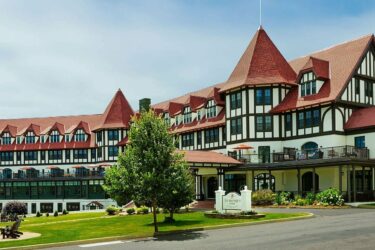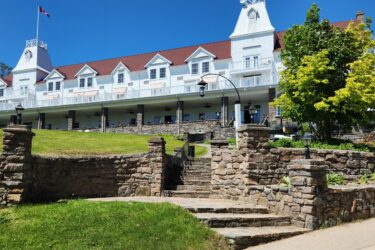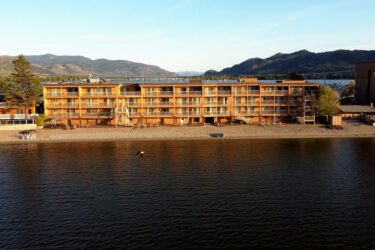
InnVest Hotels acquires The Algonquin Resort St. Andrews by‑the‑Sea, Autograph Collection and The Algonquin Golf Course
InnVest Hotels has acquired The Algonquin Resort St. Andrews by-the-Sea, Autograph Collection and The Algonquin Golf Course.
HENDERSONVILLE, Tenn. — Amid all the depressing statistics about Canadian hotel performance, Jan Freitag, senior vice-president, Lodging Insights, STR, reported that the base occupancy in Canada was “surprisingly strong.” There were also some observations about the recovery: that rubber tire traffic could return due to pent-up demand, and that the economy sector was likely to […]
HENDERSONVILLE, Tenn. — Amid all the depressing statistics about Canadian hotel performance, Jan Freitag, senior vice-president, Lodging Insights, STR, reported that the base occupancy in Canada was “surprisingly strong.” There were also some observations about the recovery: that rubber tire traffic could return due to pent-up demand, and that the economy sector was likely to lead the recovery. That being said, the picture Freitag painted during a webinar on the state of the industry in Canada and the U.S. last Thursday was bleak.
Freitag’s information was from the report for the week ended April 4, 2020. He noted that the data that STR has seen in the last couple of weeks seems to be bottoming out. “That doesn’t mean we’re in recovery. We’re just on a long trajectory on the bottom when it comes to RevPAR decline, so the data won’t change that much.” STR’s webinar will go ahead next Thursday at 3 p.m., but the webinar scheduled for April 23 has been cancelled. Once the data does start to change again, on the positive side of the pandemic, STR will schedule more webinars to keep hoteliers informed.
“Unfortunately, the data [from Canada] got worse from last week,” Freitag said. Canadian RevPAR declined 85.4 per cent for the week ending April 4, 2020. “Absolute occupancy stood at under 13 per cent, 12.8 to be exact.” ADR stands at $105 Canadian, or $50 less than the same week in the prior year.
“Of course, if we overlay the number of COVID-19 cases to the RevPAR per cent decline, you’re seeing two things,” Freitag said. “The decline has been sharp and rapid, and is now 80 to 90 per cent, which I think we will see going forward for at least the next couple of weeks — maybe eight weeks or so — we’ll see how quickly we can recover. But this is going to be the new normal going forward. Unfortunately, the increase in cases and number of hotels closing means a sharp drop in employment that will shape travel.” Statistics Canada has reported the jobs declined by one million that week, he said.
“That, of course, has implications for the rebound, for supposing that leisure travel were to come back first, that’s implying that people have money to spend. Travel will fall by the wayside, as they have to pay the mortgage and pay for school and pay for essentials. That said, because we are all holed up, we may want to just drive somewhere. I would think that drive-through markets in the U.S. and Canada, may actually see a slight bump as restrictions ease.”
Market performance by city
STR’s graph showing market performance by city, is not very different from the graph Freitag presented last week. “It shows RevPAR change by market, mainly in the 80 to 90 per cent range, with 93 per cent for Toronto and Montreal. This, unfortunately, is what we’re going to continue to see as groups and meetings, business and corporate transient travel basically come to a halt,” he said.
“The absolute levels of occupancy are surprisingly strong — for Calgary, Montreal and Toronto, certainly not; but in Ottawa with government business and in Vancouver specifically with just under 20 per cent — there are still room demands. Are these travellers or people sequestering? Each hotelier can tell about that differently, or better. But these are the base levels of occupancy that we’re finding and we can use going forward.” Freitag added that they had observed a similar trend in the U.S.
Upper class hotels hit hardest
The graph showing class performance hadn’t changed much in a week, unfortunately, Freitag said. “With the lack of groups, corporate transient and obviously very little leisure, the upper end is getting hit tremendously hard.” RevPAR decline is almost 100 per cent from the summit, “and we expect that same pattern to continue going forward.”
And just for shock value — STR is reporting four luxury class hotels in Canada with sub-3 per cent occupancy.
“This is exactly the pattern we are seeing in the U.S., and also a pattern we are noticing in China,” Freitag said. “It seems that the recovery is driven by the lower rates or classes first. That’s a pattern that we’ve noticed now and are reporting on and will continue to follow as Canada and the U.S. get through the COVID-19 crisis.”
To register for the April 16 webinar, please click here.
RELATED ARTICLE:



InnVest Hotels has acquired The Algonquin Resort St. Andrews by-the-Sea, Autograph Collection and The Algonquin Golf Course.

The new owners of the famed Windermere House hotel and resort on Muskoka’s Lake Rosseau intend to revitalize the building and its amenities while preserving the property’s historical integrity.

Proactive Hospitality has acquired the Coast Osoyoos Beach Hotel, B.C. CFO Capital arranged acquisition financing for the deal.

Tribute Portfolio – part of Marriott Bonvoy's extraordinary portfolio of 31 hotel brands – continues to grow its global family of characterful hotels with Honeyrose Hotel Montreal, a Tribute Portfolio Hotel, the brand's…